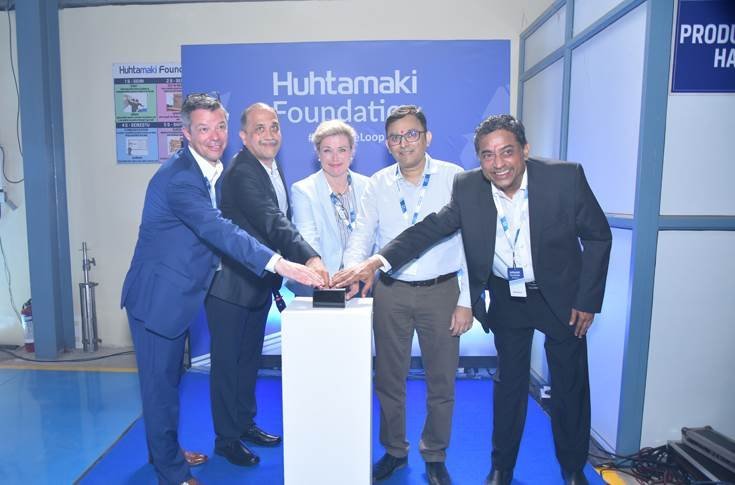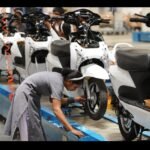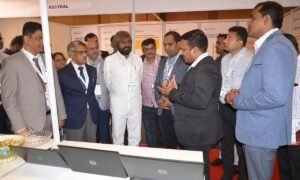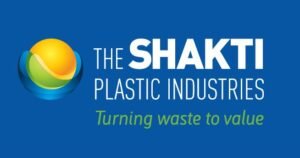The Huhtamaki Foundation, a charitable trust run by Huhtamaki India, has inaugurated its first recycling plant in Khopoli, Maharashtra to help drive circularity for packaging. The site, spread across 2,000-sqmt area, will recycle about 1,600-kg of post-consumer used flexible plastic waste per day from early May as the plant becomes fully operational.
According to Huhtamaki, it embeds sustainability in everything it does, and is committed to achieving carbon neutral production. It is designing all its products to be recyclable, compostable or reusable by 2030.
The company established Huhtamaki Foundation as a charitable trust with a view to support the conservation of the environment in India and carry out activities in relation to plastic waste. The Huhtamaki Foundation will be managed and operated independently by its trustees to achieve its core purposes.
The recycling plant was set up with an investment of Rs 90-million as part of the Huhtamaki Foundation’s #CloseTheLoop initiative to tackle post-consumer waste to deliver a valuable secondary resource material. It will process post-consumer waste to create resin to produce refined compounds to be used for household products for consumers in India.
The recycling plant — the first of a kind — uses advanced technology to enable the efficient sorting of post-consumer waste, hot washing to remove any contamination, extrusion with extra filtration and deodorisation. This ensures the recycled material can then be used for domestic appliances. The Huhtamaki Foundation worked with the local community and authority in Maharashtra, NGOs, social enterprises and educational institutes, including Swachh, Stri Mukti Sanghtana, CIPET and ICT, to develop this sustainable plastic waste management system.
“The Huhtamaki Foundation has been set up to work towards the conservation of the environment in India with a focus on driving sustainable packaging solutions and driving forward the circular economy by setting up recycling schemes. It actively advocates for alternate sustainable plastic packaging structures, solutions and ease of recyclability,” said Sunil Bhagwat, trustee of Huhtamaki Foundation.
“Setting up the recycling plant is the first step that the Huhtamaki Foundation has taken in the direction of driving circularity. Over the next few years, we will strive to set up similar facilities in major geographies in India. We are constantly evaluating newer recycling technologies that could be deployed,” he added.
The recycling plant has been constructed as per the Green Building Certification of the Confederation of Indian Industry (CII) and uses less water, optimises energy efficiency, conserves natural resources, generates less waste and provides healthier spaces for occupants, as compared to conventional facilities.
It is also a zero-discharge plant as per the latest standard of the Pollution Control Board. A state-of-the-art mechanical vapour recompression system has been installed to treat the effluent and the treated water is reused with ~90% water recovery.
In addition, a rainwater harvesting system is also deployed to conserve water. Again, the road to the plant is made of bitumen mixed with plastic waste and the multiple streetlights around the plant have been replaced by high mast lighting systems to optimise electrical utilities and cables without compromising on light luminosity. LED lights are also installed within the premises to save power.
Additionally, over 150 trees have been planted around the plant which are watered/maintained using water sprinklers and drip-irrigation technology.
“The focus is on sustainable packaging solutions and driving forward the circular economy by setting up, amongst others, programmes in environmental sustainability and recyclability, with a view to identify, incubate ad invest in opportunities designed to intercept plastics at source by collecting, sorting, processing and recycling waste so that waste gets diverted from the environment into the recycling value chain, furthering the circular economy, thereby benefiting the environment, industries and public at large,” said Marco Hilty, president, flexible packaging, Huhtamaki.
“Food packaging is instrumental in driving access to affordable food for all by ensuring hygiene and safety of food and keeping it edible for longer. Whilst the functionality of packaging can’t be compromised, further improvements in the management of post-consumer packaging waste is essential if we are to close the loop on circularity,” said Thomasine Kamerling, executive vice-president of sustainability and communications at Huhtamaki.
“In addition, closing the loop on waste handling and circularity will help in addressing some of the environmental and social impacts caused by improper waste management. Sorting waste at home is recommended as the way to prevent household waste from ending up at a landfill. By separating organic waste, plastic waste and other dry recyclables, which can be composted, recycled and upcycled, consumers can become part of the solution,” she added.









Leave a reply